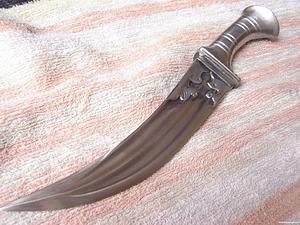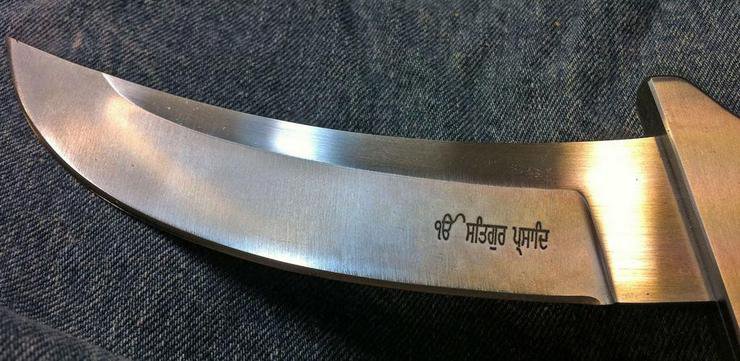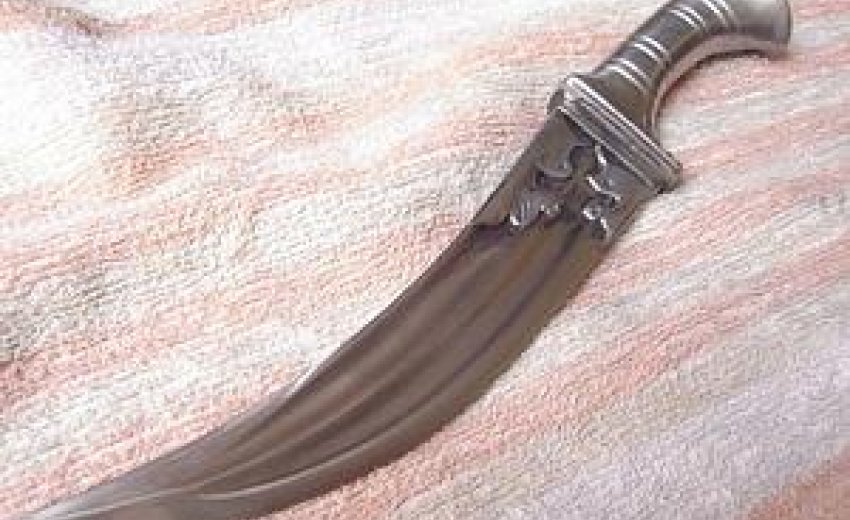 There is likely little doubt that over 300 years ago when the 10th Master’s presence graced the earth and he led Sikhs and others into necessary battle, that Sarb Loh (pure iron) was the preferred blade material for Kirpans and possibly swords that might have seen duty in the protection of oneself and the innocent. I expect those Kirpans and swords made from Sarb Loh would have had good edge holding and strength characteristics, when properly hardened and tempered.
There is likely little doubt that over 300 years ago when the 10th Master’s presence graced the earth and he led Sikhs and others into necessary battle, that Sarb Loh (pure iron) was the preferred blade material for Kirpans and possibly swords that might have seen duty in the protection of oneself and the innocent. I expect those Kirpans and swords made from Sarb Loh would have had good edge holding and strength characteristics, when properly hardened and tempered.
In almost 35 years as a professional knife, sword and Kirpan maker I've had numerous inquiries along the lines of: 'Do you offer Sarb Loh in your Kirpans?’ and if not ‘Why don't you use it in your blades? This is what Guru Gobind Singh preferred and told us to use.’
The facts are, through modem technologies today, we have far more uniform options for sharpness, toughness and especially rust resistance in contemporary blade steels. Through industrial and technological developments in metallurgy over the last 100 years, there is now a wealth of choices in the marketplace for exceptional cutlery steels. We utilize a number of those in our manufacturing and offer them through Khalsa Kirpans.
Even if we could find Sarb Loh being made somewhere in the world today, I'm not sure we'd offer it because of all the other readily available excellent choices.
Fortunately today, it might only be a very rare circumstance when one might have to rely on one’s Kirpan, to protect oneself and/or others. From my viewpoint, if we are going to carry Kirpans as Sikhs and Khalsa, shouldn’t those Kirpans be something that can serve the purpose for which they are intended in the best possible manner? And that purpose is to protect ourselves and others.
Few Kirpans that I’ve handled during my numerous trips to India reveal to me the excellence which I endeavor to put into our ‘Artisan-made Kirpans’. Most Kirpans I have seen and handled from India are not sharp, nor are their blade steels chosen for edge holding or toughness qualities. So I ask you - what practical good will those Kirpans be if God and Guru happen to place you in a situation where your capacity as a Saint-soldier is demanded?
I also believe that Kirpans should represent the highest standards of excellence in craftsmanship in their fit, finish and appearance. To fabricate our Khalsa Kirpans we searched and found a very respected manufacturer who happens to be in quite high-demand. The Kirpans are entirely hand made to very precise tolerances, using the choicest materials available. All of this is done so that you can feel proud to own and wear your Kirpan, whether on top of your clothing or underneath it.
After introducing Large Kirpans in 2008, which many worldwide enjoy as their ‘Dress Kirpan’ we introduced Compact Kirpans which can be worn all day comfortably under one’s clothing. We offer both in 3 handsome colors and even offer a choice in gatras (Kirpan straps) not only in color (black and gray or white and gray) but also in adjustable length (with a buckle) or not.
Currently we are offering 2 special discounts on these Kirpans which you can read more about here.
We will be in Yuba City, California at the Nagar Kirtan on November 4th where we will continue to offer this special discount.
Something new we have been offering for several months now, which we have received good feedback about is our ‘inspirational blade etching’, where you can have Ikongkar Satgur Prasad, Ang Sang Waheguru, or anything else you wish, to be deeply electro-chemically etched onto any Kirpan blades. We are working towards offering full sized excellent quality affordable swords (Siri Sahibs) in the near future.






